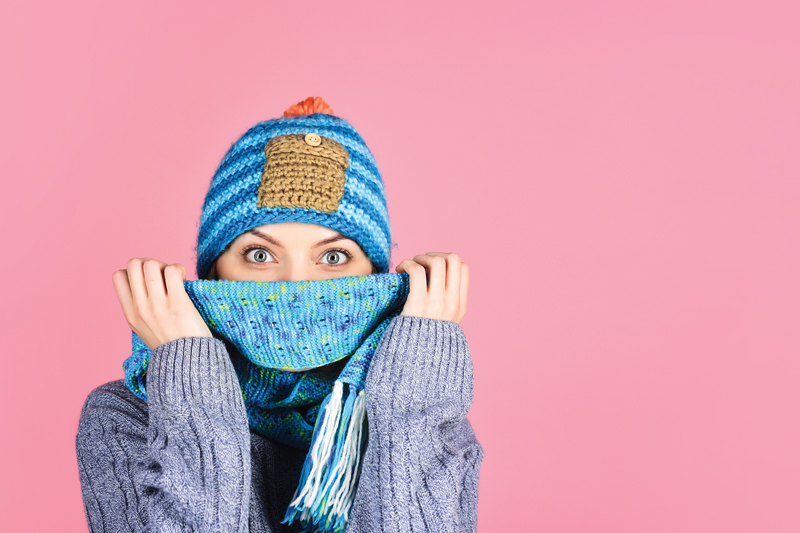The Dreaded Winter Skin/Acne Combination
 The change of seasons, the dry air, and a change in diet and exercise patterns can all bring on a change in our skin, sometimes an unwelcome change. We often see many types of acne due to these changes in our environment. Papules and pustules (red bumps and pus-filled bumps): this type is usually related to inflammation in the body and the skin. Comedones (your classic whiteheads (closed comedones) and blackheads (open comedones)) caused by plugging of hair follicles and too much sebum. Nodulocystic (deeper lesions that are hard to the touch and often painful) this type forms due to a combination of inflammation and over-production of sebum.
The change of seasons, the dry air, and a change in diet and exercise patterns can all bring on a change in our skin, sometimes an unwelcome change. We often see many types of acne due to these changes in our environment. Papules and pustules (red bumps and pus-filled bumps): this type is usually related to inflammation in the body and the skin. Comedones (your classic whiteheads (closed comedones) and blackheads (open comedones)) caused by plugging of hair follicles and too much sebum. Nodulocystic (deeper lesions that are hard to the touch and often painful) this type forms due to a combination of inflammation and over-production of sebum.
To successfully treat acne, it must be correctly identified as to elucidate the root cause, and it should be graded from mild to severe. Grading can inform the practitioner about what “force” of intervention is needed. Often mild to moderate acne will respond well to lifestyle interventions. More severe may require a stronger medication with concurrent lifestyle modifications.
Conventional Treatment of Acne
Conventional treatment of acne usually consists of antibiotics, hormonal birth control or androgen blockers, or systemic retinoids. Each of these treatment options do come with considerable side effects that could, in some cases, outweigh the benefits of the treatment! Antibiotics are good at reducing inflammation and infection from acne-forming bacteria (Cutibacterium acnes) present on the skin. Hormonal birth control and androgen-blockers reduce sebum production. Retinoids reduce inflammation, reduce sebum, and are bactericidal.
Antibiotics dramatically alter the gut microbiome, where a good deal of your immune system is housed. Antibiotic resistance is also becoming more common in healthcare and the judicious use of antibiotics should be reserved for life-threatening infections. Hormonal birth control and androgen blockers are really not an option for men. Hormonal birth control for women is often not tolerated well and can exacerbate depression and anxiety while depleting nutrients. Retinoids are vitamin A-derived and can cause liver toxicity, and the liver is our body’s main detoxification center. Retinoids can make the skin red, flaky, and itchy while they take effect.
Natural Interventions for Acne
What are some low-force interventions that can be used to avoid the dreaded winter skin – acne combination? The following is an inclusive, but not exhaustive list of simple lifestyle changes that can make a dramatic impact on skin health:
- Keep your blood sugar balanced. Hyperglycemia, caused by eating too many refined carbohydrates (essentially sugar), will spike insulin and another chemical in the body called insulin-like growth factor (IGF-1). These both have the effect of increasing sebum production. Look to add fiber, quality fat, or quality protein when you are consuming sugar to mitigate the insulin response and keep blood sugar balanced.
- Avoid low-fat dairy and processed dairy. Dairy alone is responsible for increasing insulin and IGF-1, it was designed to help babies grow. It causes growth in sebaceous glands, creating more sebum. Low-fat dairy replaces fat with fillers, which is usually sugar. Whey, a component of dairy, increases sebum as well. So, swap out that whey protein for a plant-based protein if you enjoy smoothies.
- Aim for 22+g (women), and 38+g (men) of fiber daily. Fiber fermentation in the gut produces short chain fatty acids that are anti-inflammatory and antimicrobial in nature.
- Supplementation with Zinc, Vitamin A, fish oil and probiotics.
- Sunlight. That’s right, UV light can affect the type of bacteria that colonizes the skin. Getting some sunlight on a naked face can be bactericidal and promote a healthy skin microbiome.
- Plant-based topicals. Gotu kola and neem are popular herbs in the Ayurvedic tradition for acne. Avoid coconut oil as it is a comedogenic. Instead try jojoba, grapeseed, sesame, apricot seed, or rose-hip. You may need to experiment to find the right oils for your own skin, and they may change with the seasons.
- Topical niacinamide and sulfur washes are great for reducing inflammation and healing scars. Avoid drying washes and that “tight” feeling after washing.
- Detoxification. Eating more “liver-loving” foods such as artichoke and beets and herbs such as dandelion and burdock root can enhance liver detoxification and function. Skin brushing can remove dead skin cells and improve lymphatic flow, resulting in more efficient detoxification. Exercise and sauna both promote sweating, an ancient detoxification practice.
The information presented here is not intended to diagnose or treat disease.
Sarah Buck, ND is a licensed naturopathic doctor living and working in Southern Maine. She treats an array of conditions especially gastrointestinal, autoimmune, and skin health. When not working, you can find Sarah outside with her family, enjoying some sunshine and fresh air.
Find out more at: sarahbucknd.com.




